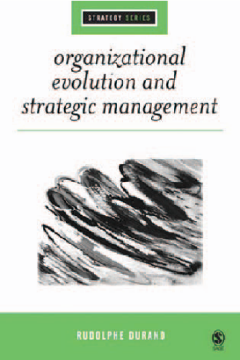
Additional Information
Book Details
Abstract
How can the argument that organisations evolve according to environmental pressures be reconciled with evidence of strategic management? This book is the first of its kind to answer this theoretical puzzle and engage readers in a balanced understanding of organizational evolution. Organization and strategy scholars often lack a clear, in-depth presentation of evolutionary ideas and may repeat mistakes that could and should be avoided. In this book, Durand embarks upon a fresh assessment of the literature. He provides the foundation for a new theory of organizational selection and an 'Organizational Evolution and Strategy' model that reconciles economic evolution with strategic intentionality. Chapters include an examination of the work by Lamarck, Darwin and Spencer; a constructive appraisal of evolutionary theory applied to organizations; and a summary of how the 'Organizational Evolution and Strategy' model will affect future theory and research.
Table of Contents
| Section Title | Page | Action | Price |
|---|---|---|---|
| Prelims (Boxes, Tables, Figures, Foreword by Nabeel Hamdi) | |||
| 1. Introduction - Building Back Better | |||
| Michal Lyons, Theo Schilderman and Graham Saunders | |||
| Part I: Setting the Scene | |||
| 2. Putting people at the centre of reconstruction | |||
| Theo Schilderman | |||
| 3. Can large-scale participation be peoplecentred? Evaluating reconstruction as development | |||
| Michal Lyons | |||
| 4. The people’s process: The viability of an international approach | |||
| Lalith Lankatilleke | |||
| Part II: Making Programmes Work for People | |||
| 5. Scaling-up people-centred reconstruction: Lessons from Sri Lanka’s post-tsunami owner-driven programme | |||
| Vishaka Hidellage and Aziza Usoof | |||
| 6. Pakistan: Implementing people-centred reconstruction in urban and rural areas | |||
| Usman Qazi | |||
| 7. Indonesia: Understanding agency policy in a national context | |||
| Jo da Silva and Victoria Batchelor | |||
| 8. India: From a culture of housing to a philosophy of reconstruction | |||
| Jennifer Duyne Barenstein and Sushma Iyengar | |||
| Part III: Lessons from the Project Level | |||
| 9. Decentralizing (re)construction: Agriculture cooperatives as a vehicle for reconstruction in Colombia | |||
| Gonzalo Lizarralde | |||
| 10. Kenya: Can temporary shelter contribute to participatory reconstruction? | |||
| Dyfed Aubrey | |||
| 11. Bangladesh: Can large actors overcome the absence of state will? | |||
| Khurshid Alam | |||
| 12. Turkey: Can small actors overcome the absence of state will? | |||
| Hakan Arslan and Cassidy Johnson | |||
| 13. Progressive housing: Reconstruction after the 2001 earthquake in El Salvador | |||
| Carmen Ferrer Calv, Concepcion Herreros and Ing. Tomas Mata | |||
| 14. Peru: The long-term impact of short-term reconstruction work | |||
| Eliseo Guzmán Negrón | |||
| 15. Conclusions | |||
| Michal Lyons, Theo Schilderman, Camillo Boano and Sandra D’Urzo |
